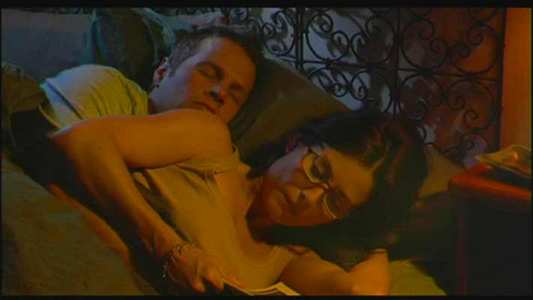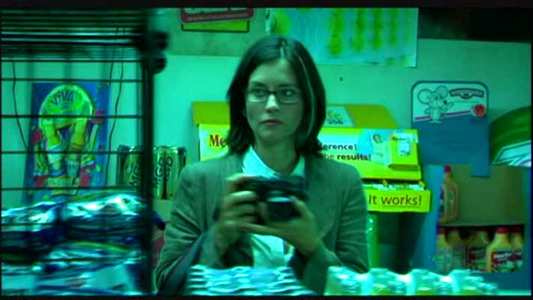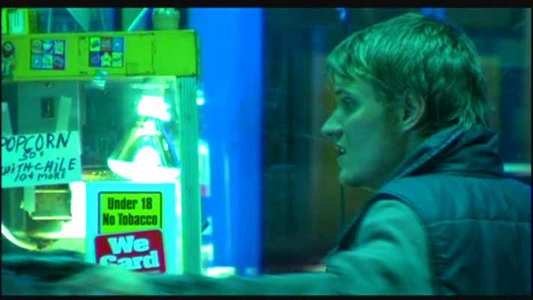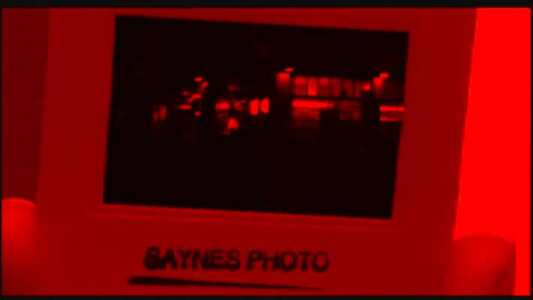Review of November
Introduction
When L.A. photographer, Sophie Jacobs` boyfriend is executed during a botched corner store robbery, her mental health quickly spirals out of control.
Simultaneously tortured by the needless murder and the guilt of an affair she was having at the time; the boundaries between reality and delusion become increasingly blurred.
She is mentally forced to revisit the murder scene through a series of inexplicable occurrences that begin while she is at work, teaching photography at the local college.
This re-ignites the police enquiry but Officer Roberts (Nick Offerman) encounters more than he bargained for, and becomes concerned for Sophie as she becomes more and more vacant and unpredictable.
Helped by her mother (Anne Archer) and sessions with her psychiatrist (Nora Dunn) Sophie tries to get her life back on track and her mind back in focus - but if you don`t know what`s real how can you ever see a future?

Video
The entire film is shot on a DVX100 mini-dv camera by cinematographer Nancy Schreiber. The different colours the movie is shot in were achieved through white balance and the cinematographer using different gels to achieve some astonishing results. It definitely wouldn`t work for every film but for this I thought it did and it completely deserves the cinematography award it picked up at the 2004 Sundance Film Festival.

Audio
2.0 Stereo
5.1 Surround

Features
Trailer
Audio Set-Up
Chapter Selection

Conclusion
What is it people say on Guy Fawke`s night? Remember, remember the fifth of November. Well, forget that, if only Courtney Cox Arquette could remember the seventh of November this film would be a whole lot easier to understand and quite possibly a whole lot better.
It is an interesting movie, a psychological thriller that has the ability to keep you thinking, and it`s certainly not conventional. Unfortunately, it`s very hard to follow and not the least bit thrilling.
I understand that Sophie`s mind is distorted due to what she has suffered and the guilt she is carrying.
I understand that the director is trying to show the effects that trauma can have on the mind and how real events can often be erased for periods of time, or even completely.
I also understand why the film is split into chapters such as denial, despair and acceptance, as these are the stages she must go through to reach recovery and peace of mind.
What I don`t understand though is what the end result of the film is.
There are so many different scenarios that any could have been reality, you just have to assume it`s the final scene.
There are too many pieces to put together without explanation or conclusion and I just found that frustrating.
I don`t buy the hard sell either that you have to think this through to fully enjoy it, that you are given the main plot line and you have to guess what happened next.
I think that`s just a poor excuse for a film that basically comprises three or four scenes played over and over with a slight twist each time.
One of the first pluses for the movie though is the dramatic cinematography - I think you`ll either like it or loathe it because Director Greg Harrison and Director of Photography Nancy Schreiber have went to town.
Every shot is like a work of art - distances, lighting and angles are all painstakingly thought out. Possibly because Sophie is a photographer, her work plays a big part in the movie and this style of shooting really makes you pay extra attention to that fact.
Also, the first chapter of the film is completely blue-lit which, I think, is to help you empathise with Sophie`s state of mind at this time. I found this very clever and it looks very stylish. It was beginning to bug me though, but then it suddenly changed to green, then gold and then white.
If you have any interest in photography at all I think you would certainly find the film interesting in one way or another. It reminds me of several other movies, Memento and Seven being the first to spring to mind. It has those grainy flash scenes of cockroaches and blood-splattered light bulbs giving it a real decaying effect.
Another plus is Courtney Cox Arquette`s performance. It`s very convincing and a long way from Friends, as she barely smiles throughout the entire film.
Sophie also has a very different look from Monica, and is supposed to be suffering mentally, and I think she captures this very well.
James LeGros` part isn`t really that challenging, I liked the shop scene and he does a good enough job in the rest of it, the same applies to Anne Archer as Sophie`s mum.
The best thing about the film though is the running time. I don`t mean to be nasty here because I think it`s just right at 78 minutes. Any longer would definitely not have worked for this film.
It`s like Phonebooth; I think that film worked so well because of its fairly short running time, any longer in that box and it would have become very annoying.
If you like psychological thrillers that don`t exactly have you on the edge of your seat but do make you think a bit, or if you simply like Courtney Cox Arquette then this could be for you.
However, I`ll borrow one of the lines from the film to reflect my opinion, "A bit too arty for it`s own good."
Your Opinions and Comments
Be the first to post a comment!